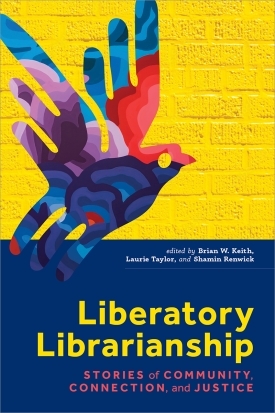Liberatory Librarianship in Action
a guest post by Brian W. Keith
Liberatory librarianship is a philosophy and practice that furthers liberation, joy, and life. Practitioners aim to dismantle oppressive structures and promote social justice, equity, and inclusion through the application of skills, knowledge, ethics, and personal dedication. By intention the concept is expansive.
In conceptualizing liberatory librarianship, the editors of our book were inspired by stories from all over the world, and especially from Caribbean librarians who demonstrated exemplary librarianship in fostering cultural perpetuity and community engagement.
Cultural Perpetuity: One of the core tenets of liberatory librarianship is decolonizing knowledge by centering Indigenous, Black, and other marginalized voices. Liberatory librarians promote and preserve rich cultural heritage and contributions of diverse communities, counter historical narratives of colonialism and oppression, empower local communities and global connections, and seek to democratize access to knowledge.
Community Engagement: Liberatory librarians engage with communities, scholars, and institutions to ensure that collections, activities, and initiatives are responsive to local needs and priorities, while also empowering movements for justice. Liberatory librarians embrace collaborative approaches that are responsive to and engaged with users.

In addition to the examples explored in the book, here are six additional real-life examples of liberatory librarianship in action:
- Community-Centered Programming: Many libraries have embraced community-centered programming that goes beyond traditional services. For example, the Ferguson Municipal Public Library in Missouri became a beacon of support during the 2014 protests following the police shooting of Michael Brown. The library stayed open, providing a safe space for residents, offering educational resources, and hosting community dialogues on race, justice, and activism.
- Diverse and Inclusive Collections: Librarians committed to liberatory practices actively curate collections that reflect the diversity of their communities. The San Francisco Public Library's Hormel LGBTQIA Center is a prime example, providing access to a wide range of materials that celebrate LGBTQIA+ voices and experiences. By doing so, they affirm the identities of marginalized groups and promote understanding and acceptance. Liberatory librarianship for collections has a long and storied history. Consider Arturo Alfonso Schomburg’s work in building what is now the New York Public Library’s Schomburg Collection and how this collection enables research, thinking, and world-changing activities. Consider also P. Gabrielle Foreman’s teaching that led to her co-founding The Colored Conventions Project which focuses on the nineteenth century's longest campaign for Black civil rights.
- Information Literacy for Social Justice: Librarians integrate social justice issues into information literacy instruction, empowering patrons to critically analyze information and understand the broader societal implications. The University of Arizona Libraries' "Social Justice in Action" initiative is one such program that teaches students how to recognize bias, evaluate sources, and engage in advocacy for social change.
- Digital Equity Initiatives: In today's digital age, access to technology and the internet is crucial. Liberatory librarianship includes initiatives to bridge the digital divide. For example, the New York Public Library's TechConnect program provides free technology classes, internet access, and device loans to underserved communities, ensuring that everyone has the opportunity to participate in the digital world.
- Cultural Competence and Anti-Oppression Training: Librarians undergo training in cultural competence and anti-oppression practices to create inclusive and welcoming library spaces. The University of Washington Libraries' Diversity, Equity, and Inclusion Committee offers workshops and resources to help library staff understand and address issues of privilege, power dynamics, and systemic inequalities.
- Partnerships with Social Justice Organizations: Librarians collaborate with social justice organizations to amplify their impact and support advocacy efforts. For instance, the Chicago Public Library partners with organizations like Black Lives Matter Chicago to host events, discussions, and workshops that promote racial justice and equity within the community.
These examples illustrate how liberatory librarianship is not just a theoretical framework but a lived commitment to transforming libraries into spaces of empowerment, education, and social change.
Learn more at the ALA Store.
